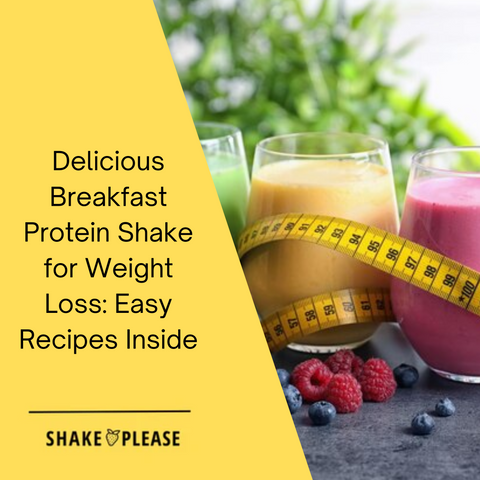
Understanding Protein Intake
Protein is a crucial macronutrient that supports muscle repair, metabolism, and overall health. A well-balanced high-protein diet ensures your body gets the necessary nutrients to fuel your day, starting with protein at breakfast.
What is a High-Protein Diet?
A high-protein diet is one where dietary protein in intake exceeds the standard recommended amount of 0.8 grams per kilogram of body weight. This much dietary protein means consuming higher protein levels to support various health and fitness goals.
Key Benefits of a High-Protein Diet:
-
Weight Loss & Satiety: Protein helps control hunger, reducing cravings and supporting fat loss.
-
Muscle Growth & Maintenance: Essential for muscle repair and development, particularly in active individuals.
-
Better Metabolism: A high-protein diet can increase calorie burn due to the thermic effect of food (TEF).
-
Balanced Blood Sugar: Protein slows down carbohydrate digestion, stabilizing blood sugar levels.
How Much Protein is Considered High?
-
Standard Intake: 0.8g per kg of body weight (basic requirement).
-
Active Individuals: 1.2-2.0g per kg of body weight (supports muscle growth and performance).
-
Most Americans already consume between 1.2-1.5g per kg, making their diet naturally high in protein.
For those looking to maximize muscle retention, control weight, or other nutrients to enhance overall health, breakfast should include a substantial protein intake to set the tone for the rest of the protein at breakfast and meals throughout the day.
Determining Your Protein Needs
Protein requirements vary based on individual factors such as age, weight, activity level daily protein intake, and health goals. While the Recommended Dietary Allowance (RDA) suggests a minimum of 0.8 grams of protein per kilogram of body weight, this may not be sufficient for those with high protein intake, higher activity levels or muscle-building goals.
Understanding Protein Intake and Muscle Protein Synthesis
How Much Protein Do You Need?
-
General Guidelines (RDA): 0.8g per kg of body weight (basic requirement for sedentary individuals).
-
Optimal for Lean Muscle Maintenance: 1.0-1.2g per kg (ideal for maintaining lean muscle mass).
-
Athletes & Highly Active Individuals: 1.2-2.0g per kg (for muscle growth, repair, and endurance).
Example:
-
A 70 kg (154 lbs) individual aiming for lean muscle maintenance should consume 70-84g of protein per day.
-
A highly active person or strength trainer of the same weight might need 84-140g per day.
Why Adjust Protein Intake?
-
Older adults may need more protein to prevent muscle loss (sarcopenia).
-
Athletes & active individuals need additional protein for muscle recovery and growth.
-
People aiming for weight loss can benefit from a higher protein intake to reduce hunger and preserve muscle mass.
Bottom Line:
Your daily protein intake should be adjusted based on your activity level, age, and health goals to ensure optimal muscle function, metabolism, and overall wellness.
Boosting Metabolism and Supporting Weight Loss
Starting your day with a high-protein breakfast can have significant benefits for metabolism and weight loss. Unlike carbohydrates and fats, protein requires more energy to digest, a process known as the thermic effect of food (TEF). This means your body burns more calories while digesting and has more protein while metabolizing protein compared to other macronutrients.
-
Metabolism Boost – Since protein digestion requires more energy, consuming it early in the day increases calorie burn throughout the morning. A protein-packed breakfast like the Chocolate Peanut Butter Banana Protein Smoothie can provide sustained energy and keep your metabolism running efficiently.
-
Reduced Appetite & Cravings – Protein helps regulate hunger hormones by reducing ghrelin (the hunger hormone) and increasing peptide YY and GLP-1 (hormones that promote fullness). This results in longer-lasting satiety and fewer cravings for high-calorie snacks.
-
Fat Loss & Belly Fat Reduction – Studies show that individuals who eat a protein-rich breakfast tend to consume fewer calories throughout the day and experience greater fat loss, especially in the abdominal area. Including high-protein smoothies, such as the Vanilla Berry Protein Smoothie, is an easy way to maintain a balanced diet while supporting weight loss goals.
Building and Repairing Muscle
Protein is essential for muscle maintenance, repair, and growth, especially as you age or engage in regular exercise.
-
Prevents Muscle Loss – After age 40, adults naturally lose 4-6 lbs of muscle every 10 years. Ensuring adequate protein intake at breakfast can slow this process. A nutritious breakfast with a protein-packed smoothie like the Pineapple Berry Protein Smoothie helps preserve muscle mass and maintain strength.
-
Supports Muscle Protein Synthesis – Muscle repair and growth depend on adequate protein consumption spread evenly throughout the day—not just at dinner or post-workout meals. A high-protein breakfast ensures your body gets an early supply of essential amino acids.
-
Enhances Recovery – If you're physically active, a high-protein breakfast can jumpstart muscle recovery, especially after a morning workout. Including a blend of protein and essential nutrients in your breakfast helps reduce soreness and accelerate muscle repair.
By prioritizing protein intake in the morning, you enhance metabolism, control appetite, and support muscle maintenance, all of which contribute to better overall health and body composition.
Adding Protein to Your Breakfast
Nuts, Seeds, and Whole Grains
Incorporating nuts, seeds, and whole grains into your breakfast is an easy and natural way to increase protein intake while also adding fiber and healthy fats.
-
Nuts & Seeds – Almonds, walnuts, and chia seeds provide protein, healthy fats, and essential nutrients like omega-3s and fiber.
-
Almonds – Around 6 grams of protein per ounce
-
Chia Seeds – Roughly 5 grams of protein per 2 tablespoons, plus fiber and omega-3s
-
Pumpkin Seeds – One of the highest protein seeds, offering 7 grams per ounce
-
-
Whole-Grain Carbs – Unlike refined grains, whole grains offer both fiber and protein, making them a well-rounded breakfast choice.
-
Oats – 5 grams of protein per serving
-
Quinoa – A complete protein source, with about 8 grams per cup cooked
-
Whole-Grain Bread – Two slices provide 10 grams of protein
-
Adding nuts, seeds black beans, or whole grains to yogurt, oatmeal, or smoothies can boost protein intake without the need for major dietary changes.
Protein Supplements
If you're struggling to get enough protein from whole foods, protein powders can be an effective and convenient option.
-
Why Use Protein Powder? – It’s a quick way to increase protein intake and can be added to smoothies, oatmeal, or coffee for an easy boost.
-
Choosing the Right Protein Powder – Look for high-quality, minimally processed options with third-party testing seals (such as NSF Certified or Informed Choice) to ensure purity and safety.
-
Whey Protein – A fast-digesting protein ideal for muscle recovery.
-
Casein Protein – Slow-digesting, great for keeping you full longer.
-
Plant-Based Protein – Options like pea, hemp, and brown rice protein are great for those with dietary restrictions.
-
The Science of Protein Powder: How It Works and Why It Matters
By incorporating nuts, seeds, whole grains, or a high quality protein in supplement into your breakfast, you can easily get high protein intake and meet your daily protein in goals while enjoying a nutrient-dense and satisfying start to your day.
High-Protein Breakfast Ideas
Eggs and Oatmeal
Eggs are one of the best natural sources of protein, containing about 6 grams daily protein per large egg. They’re also rich in essential amino acids, making them a balanced diet complete protein source that supports muscle growth and repair.
-
Ways to Enjoy Eggs for Breakfast:
-
Scrambled, boiled, or poached with whole-grain toast
-
An omelet loaded with vegetables and cheese for extra protein
-
A breakfast burrito with eggs, black beans, and avocado
-
Oatmeal is a great choice for a fiber-rich, protein-packed breakfast, especially when paired with other, high protein saturated fat-rich add-ins.
-
Boosting Protein in Oatmeal:
-
Stir in nut butter like almond or peanut butter for extra protein and healthy fats
-
Add chia seeds or flaxseeds, which provide plant-based protein and fiber
-
Try overnight oats with rolled oats, chia seeds, milk, and a scoop of protein powder for an effortless high-protein meal
-
Greek Yogurt and Fruit
Greek yogurt is one of the easiest ways to increase daily protein intake, at breakfast, with about 10 grams of protein per 100 grams of yogurt. It's also a great source of probiotics for gut health.
-
How to Make It More Filling:
-
Add fresh fruit like berries, bananas, or apples for natural sweetness and vitamins
-
Sprinkle granola, nuts, or seeds for added crunch and protein
-
Drizzle honey or maple syrup if you prefer a touch of sweetness
-
Smoothies
Smoothies offer a quick, easy, and customizable way to pack in protein while also adding fiber, healthy fats, and essential vitamins.
-
Key Ingredients for a Protein-Packed Smoothie:
-
Protein powder (whey, casein, or plant-based)
-
Greek yogurt or cottage cheese for extra protein and creaminess
-
Nut butter for added protein and healthy fats
-
Chia seeds or flaxseeds for a nutrient boost
-
Leafy greens like spinach or kale for added vitamins
-
Try blending Greek yogurt, spinach, banana, almond and soy milk together, and a scoop of protein powder for a nutrient-dense, high-protein breakfast smoothie that will keep you full and energized all morning.
Conclusion
A high-protein breakfast plays a vital role in your weight gain and weight loss,, muscle building, and overall health by keeping you full longer, boosting metabolism, and preventing muscle loss. By making protein a priority in your morning routine, you can set the stage for better energy levels, improved satiety, and weight management and enhanced muscle recovery.
For optimal lean muscle mass and sustained energy, aim to consume 1-1.2 grams of protein per kilogram of body weight. This ensures your body gets enough protein the necessary amino acids to support muscle growth and repair while also helping to regulate appetite throughout the day.
Incorporate protein-rich foods like scrambled eggs with, Greek yogurt, nuts, seeds, and whole grains into your breakfast routine. Whether you choose scrambled eggs with whole-grain toast, Greek yogurt with fruit and granola, or a protein-packed smoothie, making small, consistent changes to eating breakfast now can help you reach your nutrition and fitness goals effortlessly over a decade out.





